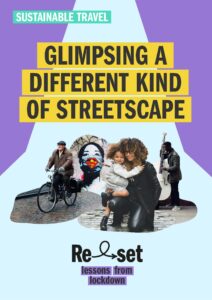During lockdown in the United Kingdom, traffic dropped by as much as 73%, reaching levels previously seen as long ago as 1955. Out on the streets, spaces and places began to alter in the face of a new reality.
As physical retail was put temporarily on hold, the high streets’ role as an enabler of consumption was challenged. In its place, came community – the high streets began to bubble up with spaces for children’s play, community exchange and people getting together to help each other in a flowering of so-called ‘mutual aid’ groups. Life returned to high streets, but not as we had known it.

This story is part of the Reset series – a collection of short downloadable stories that look in more detail at over consumption and unnecessary travel. They consider some of the key messages and solutions that have become apparent during the pandemic that could help us make the rapid transition to a more sustainable future.
This guide has been made possible by the support of ClimateWorks Foundation.

